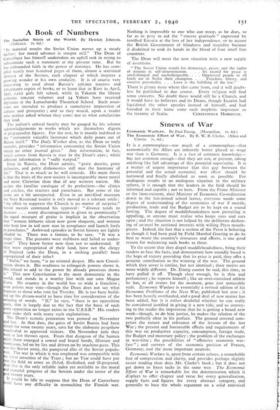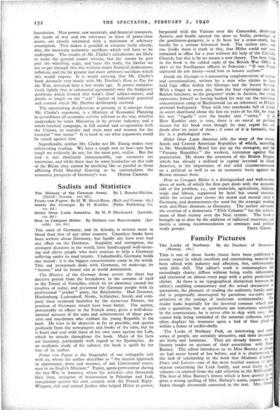Sinews of War
IT is a commonplace—too much of a commonplace—that economically the Allies are infinitely better placed to wage war than is Germany. It is a fact of common knowledge- buF not common enough—that they are not, at present, taking anything like full advantage of this potential superiority. It is a matter of urgent importance that this gap between the potential and the actual economic war effort should be narrowed and finally abolished as soon as possible. For analogous results in an analogous situation in the military sphere, it is enough that the leaders in the field should be informed and capable ; not so here. From the Prime Minister or the (non-existent, alas) Minister of Economic Co-ordination • down to the last-joined school leaver, everyone needs some degree of understanding of the economics of war if morale, production, trade and the Budget are to be kept on a sound footing. The degree of muddleheadedness now prevailing is appalling, as anyone must realise who keeps eyes and ears open ; and the situation is not helped by the deliberate darken- ing of co-msel by sectional interests with willing Press mouth- pieces. Indeed, the fact that a section of the Press is behaving as though it had been paid by Field Marshal Goering to do its best to waste the country's resources and efforts, is one good reason for welcoming such books as these.
To the extent that they dispel muddleheadedness, bring their readers to face the facts, and demonstrate how soundly based is the hope of victory providing that its price is paid, they offer a genuine contribution to the winning of the war. The ground which they cover is similar, but not identical ; their merits are more widely different. Dr. Einzig cannot be said, this time, to have pulled it off. Though clear enough, he is thin and perfunctory ; he repeats himself ; like an over-exercised athlete he has, at all events for the moment, gone just noticeably stale. Economic Warfare is essentially a revised edition of his Economic Problems of the Next War, published last year ; it has been heavily overhauled, and a good deal of new matter has been added, but it is rather doubtful whether he can really be considered justified in giving it a new title, and so convey- ing to the reader the impression that he is getting a brand new work—though, to do him justice, he makes the relation of the two perfectly clear in his preface. The ground covered com- prises the nature and relevance of the lessons of the last War ; the present and foreseeable effects and requirements of this war on productive capacity, consumption, foreign trade, the Budget and monetary policy ; the problem of the exchanges in war-time ; the possibilities of "offensive economic war- fare " ; and surveys of the economic position of France, Germany, and the more important neutrals.
Economic Warfare is, apart from certain echoes, a remarkable feat of compression and clarity, and provides perhaps slightly easier reading than does Mr. Clarke's book ; but it does not get down to brass tacks in the same way. The Economic Effort of War is remarkable for the determination which it displays to offer chapter and verse for every generalisation, supply facts and figures for every abstract category, and generally to base the whole argument on a solid statistical
foundation. Man power, raw materials, and financial resources, the needs of war and the relevance to these of peace-time assets, are closely estimated with a minimum of arbitrary assumption. This makes it possible to estimate fairly closely, also, the necessary economic sacrifices which will have to be undergone. The results of Mr. Clarke's calculations are likely to make the general reader whistle, but the sooner he gets past the whistling stage, and faces the truth, the likelier we are to get through this war without major financial dislocations, inflation, and the far greater and more arbitrary sacrifices which this would impose. It is worth noticing that Mr. Clarke's book dovetails very neatly with Mr. Durbin's How to Pay for the War, reviewed here a few weeks ago. It passes compara- tively lightly (but in substantial agreement) over the budgetary problems which formed that book's chief subject-matter, and dwells at length on the " real " factors of industrial potential and control which Mr. Durbin deliberately omitted.
The outstanding desideratum at present, as it emerges from Mr. Clarke's argument, is a Ministry of Economic Planning to co-ordinate all economic activity relevant to the war, whether undertaken by other Ministries or by private industry, and a whole-hearted campaign, in full accord and co-operation with the Unions, to transfer and train men and women for the essential "war sector." It is hard to see what arguments could be raised against him.
Superficially, neither Mr. Clarke nor Dr. Einzig makes very exhilarating reading. We have a tough row to hoe—just how tough we evidently do not, for the most part, realise. But the task is not absolutely immeasurable, our resources are enormous, and while there may be some headaches on this side of the Rhine they cannot be anything like so painful as those afflicting Field Marshal Goering as he contemplates the economic prospects of Germany's war. HONOR CROOME.







































 Previous page
Previous page